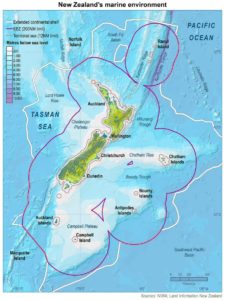The science is never settled. Only we are settled. What we knew for certain last week, last year or even for half a life might need reforming today.
Over the last ten years or so, as the heat faded from the warming dimension of climate change, so alarm was raised about the dire effects of ocean “acidification”. The mainstream media began to describe the appalling effects on sea life, especially creatures with exoskeletons, of the increasingly “acid” waters being created by higher and higher levels of carbon dioxide (CO2) in the atmosphere.
Coral reefs were doomed, many even now were “suffering” and all were in peril of destruction if we continued “spewing” huge quantities of CO2 into the air. Crabs, crayfish, shellfish of all kinds, plankton and krill were all at risk, and their decline spelt doom for the higher creatures in the sea, even unto man himself, who eats them.

The conch shell at left was exposed to current CO2 levels; the shell at right was exposed to the highest levels in the study. (Tom Kleindinst, Woods Hole Oceanographic Institution)
Now, published in the December 1 issue of Geology, comes a remarkable—and remarkably courageous—study from the Woods Hole Oceanographic Institution that shows many denizens of the oceans benefit hugely from that increased CO2. Did you predict that?
The study makes it clear that many forms of oceanic life are disadvantaged to some degree by increased acidification, but this message is very different from the hitherto confident, ceaseless prognostications of universal doom proceeding from the pens of the alarmists. The scientists are calling for more detailed studies to be done, because there is so much to learn.
Anthony Watts, over at WUWT (hat-tip to Anthony), puts it succinctly:
And some thought ocean acidification would destroy everything.
Here’s how the media release from WHOI begins:
In a striking finding that raises new questions about carbon dioxide’s impact on marine life, Woods Hole Oceanographic Institution (WHOI) scientists report that some shell-building creatures—such as crabs, shrimp and lobsters—unexpectedly build more shell when exposed to ocean acidification caused by elevated levels of atmospheric carbon dioxide (CO2).
Sorry, but I guess the paper itself is behind a pay-wall; there’s no link I can find at WHOI.
Views: 381



























